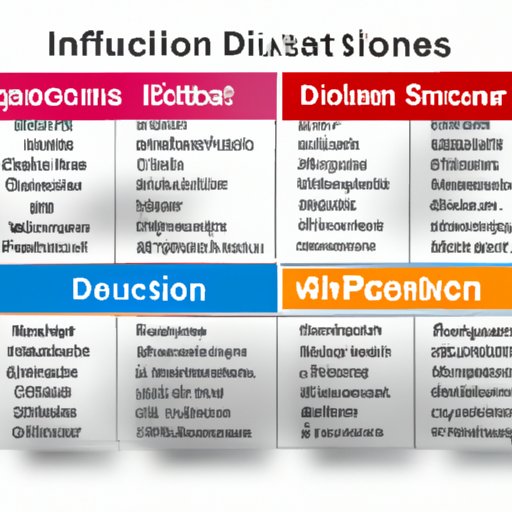Introduction
Health insurance is a type of insurance coverage that pays for medical care costs incurred by the insured person. In most cases, employers are required to provide their employees with health insurance as part of their benefits package. For many employers, this means deducting a portion of each employee’s paycheck to cover the cost of health insurance premiums.
In this article, we will explore the pros and cons of mandatory health insurance deduction from paychecks, as well as its impact on employees’ financial well-being, how employers benefit, and how it affects employer/employee relationships. We will also look at how health insurance deduction impacts employee retention and compare it across different industries.

Analyzing the Pros and Cons of Mandatory Health Insurance Deduction from Paychecks
Before deciding whether or not to take out health insurance deductions from employees’ paychecks, it is important to understand both the pros and cons of this practice. Let’s take a closer look at each.
Pros
There are several potential benefits of taking health insurance deductions from employees’ paychecks. These include:
- Lower Cost of Coverage: By having the employer cover a portion of the premium cost, employees can potentially save money on their health insurance premiums. According to a study by the Kaiser Family Foundation, “employers pay an average of 82% of the premium for single coverage and 69% of the premium for family coverage for health plans offered to their workers.”
- Access to More Comprehensive Coverage: Employer-sponsored health plans often offer more comprehensive coverage than individual plans. This includes access to additional services such as preventive care, mental health services, and prescription drug coverage.
- Financial Protection in Case of Illness or Injury: Having health insurance can provide financial protection in case of illness or injury. Without health insurance, the costs associated with medical care can be financially crippling.
Cons
On the other hand, there are also some potential drawbacks to taking health insurance deductions from employees’ paychecks. These include:
- Decrease in Take Home Pay: The most obvious downside of taking health insurance deductions from employees’ paychecks is that it can result in a decrease in take home pay. This can be particularly problematic for those living on a tight budget.
- Risk of Not Having Enough Money to Cover Other Expenses: If an employee has a large health insurance premium deduction, they may find themselves short on funds to cover other necessary expenses such as rent, food, and utilities.
Exploring the Impact of Health Insurance Deduction on Employees’ Financial Well-Being
As we have seen, taking health insurance deductions from employees’ paychecks can have a significant impact on their financial well-being. Let’s take a closer look at how this can manifest itself.
Decrease in Take Home Pay
The most obvious consequence of taking health insurance deductions from employees’ paychecks is a decrease in take home pay. Depending on the size of the premium, this could mean hundreds or even thousands of dollars less in an employee’s pocket each month.
Difficulty Affording Other Necessities
With a smaller paycheck, employees may find themselves struggling to make ends meet. This can lead to difficulty affording other necessities such as food and housing. According to the U.S. Census Bureau, “nearly one in five households reported difficulty affording food in 2017.”
Increased Debt
If an employee is already struggling to make ends meet, they may turn to credit cards or personal loans to cover their expenses. This can lead to an increase in debt, which can in turn lead to further financial hardship.
Examining How Employers Benefit from Health Insurance Deduction from Paychecks
While health insurance deduction from paychecks can have a negative impact on employees’ financial well-being, there are also some potential benefits for employers. Let’s take a look at how employers can benefit from this practice.
Reduced Employer Costs
By having employees pay a portion of their health insurance premiums, employers can reduce their own costs. According to a survey by the National Business Group on Health, “the average employer contribution to health benefits for employees was $4,788 in 2018, down from $5,081 in 2017.”
Enhanced Employee Benefits
Another potential benefit of health insurance deduction from paychecks is that it can enable employers to provide more comprehensive coverage to their employees. By covering a portion of the premium cost, employers can offer better benefits while still reducing their own costs.
Improved Job Satisfaction
Finally, providing employees with access to quality health insurance can improve job satisfaction. According to a survey by the Society for Human Resource Management, “78% of employees said health insurance is extremely or very important when considering a new job.”
Investigating How Health Insurance Deduction Affects Employer/Employee Relationships
The decision to take out health insurance deductions from employees’ paychecks can also have an impact on employer/employee relationships. Here are some potential effects:
Increased Transparency
When employers provide employees with detailed information about their health insurance premiums, it can lead to increased transparency between the two parties. This can help to create an environment of trust and understanding.
Improved Communication
Having regular conversations about health insurance deductions can encourage improved communication between employers and employees. This can help to ensure that everyone is on the same page when it comes to understanding their health insurance coverage.
Increased Trust
Finally, providing employees with clear information about their health insurance premiums can lead to increased trust between the two parties. When employees know that their employer is committed to providing them with quality health insurance coverage, it can lead to greater job satisfaction and loyalty.

Understanding How Health Insurance Deduction Impacts Employee Retention
Providing employees with access to quality health insurance can also have a positive impact on employee retention. Here are some ways that health insurance deduction can incentivize employees to stay with their current employer:
Incentivizing Employees to Stay
Offering employees access to quality health insurance can be a powerful incentive for them to stay with their current employer. According to a report by the Robert Wood Johnson Foundation, “employees who are satisfied with their health insurance benefits are more likely to stay with their current employer.”
Making Employees Feel Valued
Providing employees with access to quality health insurance can also make them feel valued by their employer. When employees feel appreciated, they are more likely to stay with their current employer.
Enhancing Employee Loyalty
Finally, offering employees access to quality health insurance can enhance employee loyalty. When employees feel secure in their health insurance coverage, they are more likely to remain loyal to their employer.

Comparing Health Insurance Deduction Across Different Industries
The decision to take out health insurance deductions from employees’ paychecks can vary depending on the industry. Let’s take a look at how health insurance deduction is handled in three different industries.
Healthcare Industry
In the healthcare industry, employers are typically required to provide their employees with health insurance. This is due to the fact that healthcare professionals are exposed to a greater risk of illness or injury. As such, employers must cover a larger portion of the premium in order to provide their employees with adequate coverage.
Technology Industry
In the technology industry, employers are often able to negotiate lower rates for their health insurance premiums. This is due to the fact that tech companies tend to have a younger workforce, which generally results in lower premiums. As such, employers may be able to pass some of the savings on to their employees.
Retail Industry
In the retail industry, employers are typically able to negotiate lower rates for their health insurance premiums. This is due to the fact that retail workers are generally paid less than other industries, which results in lower premiums. As such, employers may be able to pass some of the savings on to their employees.
Conclusion
Taking health insurance deductions from employees’ paychecks can have both positive and negative consequences. On the one hand, it can lead to lower costs for both employers and employees, as well as access to more comprehensive coverage. On the other hand, it can result in a decrease in take home pay and difficulty affording other necessary expenses. It is important to weigh the pros and cons of this practice before deciding whether or not to implement it.
It is also important to consider how health insurance deduction can impact employer/employee relationships, employee retention, and financial well-being. By providing employees with transparent information about their health insurance premiums, employers can create an environment of trust and understanding. This can lead to increased job satisfaction and loyalty, as well as improved communication between the two parties.
Finally, it is important to understand how health insurance deduction is handled differently across industries. In the healthcare industry, employers are typically required to provide their employees with health insurance. In the technology and retail industries, employers may be able to negotiate lower rates for their health insurance premiums.
In conclusion, taking health insurance deductions from employees’ paychecks can have both positive and negative consequences. It is important to weigh the pros and cons of this practice before deciding whether or not to implement it, as well as consider how it can impact employer/employee relationships, employee retention, and financial well-being.
(Note: Is this article not meeting your expectations? Do you have knowledge or insights to share? Unlock new opportunities and expand your reach by joining our authors team. Click Registration to join us and share your expertise with our readers.)
